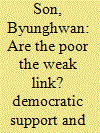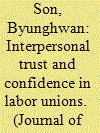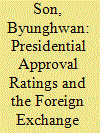| Srl | Item |
| 1 |
ID:
147308


|
|
|
|
|
| Summary/Abstract |
Extant literature on democratization documents that ordinary citizens’ unconditional support for democracy is indispensable to democratic consolidation. Yet observers of nascent democracies have repeatedly witnessed that such support often hinges upon their economic conditions. This article argues that income levels have a conditioning effect on this relationship; the Korean poor see democracy as a tool for income redistribution and are less likely than the rich to support it when economic hardships appear to close windows of opportunities for such redistribution. Using survey data from the first round of the Asian Barometer Survey on South Korea, I find strong empirical support for this argument. The implication of this finding for broader literature on democratization is that the weakening of young democracies can be attributed to the poor in times of trouble, or the “weak link.”
|
|
|
|
|
|
|
|
|
|
|
|
|
|
|
|
| 2 |
ID:
174129


|
|
|
|
|
| Summary/Abstract |
How do ordinary citizens view labor unions? The importance of public opinion about unions has rarely been highlighted in the contemporary literature on labor politics. Using five waves of the World Value Surveys on South Korea, this article suggests that public confidence in labor unions is significantly affected by individuals’ interpersonal trust, conditional on their perception of the political representation of labor. Unlike those with high levels of trust, low-trust individuals view unions as an agent seeking their exclusionary interests at the expense of the rest of the society. The difference between high- and low-trust individuals’ confidence in labor unions is more pronounced when a liberal, rather than a conservative, government is in power because of the public perception that labor interests are already well-represented by the liberal government and union functions are redundant in such a circumstances. The empirical findings are found robust to alternative theoretical arguments and empirical techniques.
|
|
|
|
|
|
|
|
|
|
|
|
|
|
|
|
| 3 |
ID:
161559


|
|
|
|
|
| Summary/Abstract |
Existing theories on real exchange rates predict a significant undervaluation of the Korean won (KRW) in the early and mid-1990s. The paper demonstrates why this expectation did not materialize and instead an unprecedentedly large degree of overvaluation took place. Focusing on three variables, namely, financial repression, devaluation pass-through, and policy exhibitionism, the paper examines how the unraveling of the developmental state eventually gave rise to the 1990s’ overvaluation. It argues that the policy exhibitionism of the new civilian government amplified the influence of Chaebol on monetary policies, which in turn created a strong appreciative force to KRW. It also contends that the increasing exchange rate pass-through onto the prices of imported intermediate goods explains why Chaebol did not desire to tame the excessive appreciative trend despite its detrimental effect on their exports. The paper offers policy implications for other state-led, emerging economies.
|
|
|
|
|
|
|
|
|
|
|
|
|
|
|
|
| 4 |
ID:
181395


|
|
|
|
|
| Summary/Abstract |
Do presidential approval ratings affect exchange rates? The empirical purview of the vast literature on this topic has been confined to the run-up to elections. The importance of approval ratings in non-election periods has therefore been under-studied. Examining daily data on the exchange rate of the Korean won during the presidency of Park Geun Hye, we find that the won weakened (1) when Park’s ratings were low and (2) when they bounced back unexpectedly from a low level. This finding explains why Park’s impeachment did not lead to a serious panic in the won market. It seems that well before the impeachment, the exchange rate already reflected the market’s concerns about the uncertainty in the government.
|
|
|
|
|
|
|
|
|
|
|
|
|
|
|
|